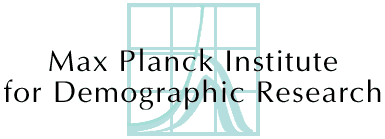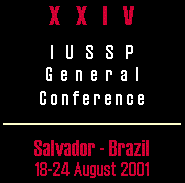|
Новая база данных "Показатели человеческого развития"
на сайте ПРООН
Уважаемые пользователи сети интернет!
Отдел Докладов о человеческом развитии Программы развития
ООН (HDRO) сообщает, что на сайте HDRO по адресу
www.undp.org/hdro в разделе Human Development Report 2001 (Доклад о человеческом
развитии, 2001) находится база данных "Показатели человеческого
развития" ("Human Development Indicators").
Эта база данных дает возможность:
- увидеть PDF файлы с таблицами показателей в том виде, как они
опубликованы в Докладе;
- загрузить данные по отдельным показателям в EXCEL файлы (выбор
нескольких показателей пока не предусмотрен);
получить информацию об источниках данных, используемых определениях
и других деталях, указанных в подстрочных примечаниях;
- создать рабочий массив данных для каждой страны путем объединения
всей информации, имеющейся в таблицах показателей.
- Указанная база данных опубликована одновременно с выходом Доклада.
Пользователи интернета впервые получают доступ к полному массиву
показателей с возможностями интерактивного доступа.

4-МЕСЯЧНАЯ СТАЖИРОВКА В США ДЛЯ ИССЛЕДОВАТЕЛЕЙ
В ОБЛАСТИ СОЦИАЛЬНЫХ И ГУМАНИТАРНЫХ НАУК
из Воронежа и Воронежской области, Екатеринбурга и Свердловской
области, Томска и Томской области
на конкурсной основе
Заявка на участие в конкурсе должна быть подана
не позднее 15 августа 2001 года
CARNEGIE RESEARCH FELLOWSHIP PROGRAM 2001
RESEARCH OPPORTUNITIES IN THE UNITED STATES
FOR SCHOLARS IN THE HUMANITIES AND SOCIAL SCIENCES
A Program of the National Council for Eurasian and
East European Research (NCEEER)
In conjunction with the American Councils for International Education:
ACTR/ACCELS
Supported With a Grant from Carnegie Corporation of New York
PROGRAM DESCRIPTION:
The National Council for Eurasian and East European Research is
pleased to announce the competition for the Carnegie Research Fellowship
Program in the United States for the 2001-2002 academic year. Scholars
from eligible regions of Russia in the humanities and social sciences
may apply for individual, non-degree research opportunities at universities
and institutes in the United States. This competition selects university
faculty, researchers, advanced graduate students, and scholars in
the social sciences and humanities from the cities of Tomsk, Ekaterinburg,
Voronezh and their respective oblasts. All fellows will conduct
research on specific topics in the social sciences and humanities,
write a 15 to 30 page academic paper for presentation upon the fellow's
return home, and deliver lectures with the goal of contributing
to the further development of higher education and scholarship in
the Russian Federation. The Carnegie Research Fellowship Program
(CRFP) is administered by the National Council for Eurasian and
East European Research (NCEEER) in collaboration with the American
Councls for International Education: ACTR/ACCELS (American Councils).
Participants in CRFP will conduct research in the United States
for four months.
Participants in the CRFP will receive the following: Round-trip
airfare from their home cities to their host universities in the
United States, pre-academic orientation, monthly stipend, health
insurance, access to libraries and archives, professional development
and alumni activities. There will also be limited funds available
for pre-program English language training for some candidates.
DEADLINE FOR SUBMISSION OF APPLICATIONS: August 15, 2001
ELIGIBILITY:
- Individuals who are eligible to participate in CRFP:
- Citizens of Russia who are residing, working, or studying in
one of the following regions: Voronezhskaya Oblast, Sverdlovskaya
Oblast, or Tomskaya Oblast.
- Applicants whose proposals relate to the themes chosen by one
of the Centers for Advanced Study and Education:
- Tomsk State University -- Russia's Integration into the
World Community
- Ural State University -- Tolerance in a Contemporary Civilization
- Voronezh State University -- Culture in a Contemporary
Society (Intercultural Communication and Interaction of Cultures;
Social Nature of Conflicts; Historic and Cultural Legacy in
the Dialogue of Cultures; Region in the System of Economic,
Political and Legal Relations: Federalism and Local Self-Government)
- Advanced graduate students, university faculty and scholars
at any stage in their careers who have not recently conducted
research projects at U.S. institutions.
- Scholars who hold a "Kandidatskaya" degree or higher,
or who are working towards a "Kandidatskaya" degree
at the time of application.
- Scholars who have a level of proficiency in written and spoken
English that is sufficient to conduct independent research and
engage colleagues.
- Scholars who have publications (advanced graduate students
may cite papers presented at acadeic conferences) in a particular
field.
- Scholars who are able to receive and maintain a United States
J-1 visa.
- Scholars who are able to begin CRFP in the United States in
January 2002.
NCEEER and the American Councils do not discriminate on the basis
of race, color, sex, religion, national or ethnic origin, handicap
or disability.
Individuals NOT eligible:
- Spouses of U.S. citizens or spouses of citizens of countries
other than the countries of the NIS.
- Individuals who have applied for an immigrant visa to any country,
or who have requested political asylum in any country (this includes
individuals who hold or have applied for a U.S. "green card"
or who have applied to the U.S. Diversity Immigrant Visa Lottery).
- Employees of NCEEER and American Councils, their spouses, children,
and grandchildren are not eligible to participate in any NCEEER/American
Councils-administered competition.
The CRFP provides no financial support for the family members or
dependents of program participants.
All CRFP participants must return immediately to their home countries
for at least two (2) calendar years upon completion of the program
in the United States. No requests for visa extensions, waivers,
or transfers will be granted under any circumstances.
INQUIRIES AT:
NCEEER and American Councils office
Leninskii Prospekt, dom 2, kom. 526 Moscow 117049, Russia
tel: (095) 956-7808
fax: (095) 230-2233
e-mail: nceeer@actr.ru
academic@actr.ru
rsep@actr.ru


Вакансии для приглашенных исследователей в Институте
демографических исследований Макса Планка (Росток, Германия)
Зимний семестр 2001-2002 годов
Openings at the Max Planck Institute for Demographic
Research
for Visiting Scholars (Ph.D. Students and Post-Docs)
Winter Semester 2001/2002
The Max Planck Institute for Demographic Research in Rostock, Germany,
has openings for Visiting Scholars for stays of one to five months
between October 1, 2001 and February 28, 2002. The openings are
primarily intended for doctoral students or post-doctoral fellows
who want to pursue an individual scientific program in one of our
research groups or laboratories and who cannot get financial support
for their visit from their home institutions. There are many openings
in the:
- Laboratory of Survival and Longevity, headed by Prof. J. Vaupel,
and
- Laboratory of Contemporary European Fertility and Family Dynamics,
headed by Prof. J. Hoem.
There are also some openings in the:
- Research Unit on Reproductive Health, headed by Prof. E. Carlson,
- Research Group on Social Dynamics and Fertility, headed by
Prof. H-P. Kohler,
- Research Group on Population, Economy and Environment, headed
by Dr. A. Fuernkranz-Prskawetz, and
- Research Group on the Demography of Early Adulthood, headed
by Dr. F. Billari.
With the approval of the head of the laboratory or research
group, Visiting Scholars may take appropriate research seminars,
generally only one or two at a time, offered by the International
Max Planck Research School for Demography (IMPRSD). For further
information about the Max Planck Institute for Demographic Research
(MPIDR), please visit www.demogr.mpg.de.
For information about courses offered by the International Max Planck
Research School for Demography, please visit www.imprsd.org.
For specific information about the Visiting Scholars Program, contact
Prof. Elwood Carlson, at carlson@demogr.mpg.de.
Please send an application (including CV, statement
of research interests, proposed program of individual research and
IMPRSD courses, and description of your statistical and demographic
education) to Prof. Carlson by email before July 15, 2001. Before
submitting a final application, it would be useful to submit a tentative
application as soon as possible. Applicants can expect to be notified
concerning acceptance by August 1, 2001. Preference is given to
individuals with handicaps. MPIDR encourages applications from women.


|
|
Продолжается подготовка к XXIV Всеобщему Конгрессу по
народонаселению Международного Союза по научному изучению
населения (IUSSP), который состоится в бразильском городе
Сальвадор (штат Багия) 18-24 августа 2001 года.
Одна из 67 секций Конгресса посвящена демографии Центральной
и Восточной Европы.
Организатор секции - Анатолий Вишневский (Россия).
|
15 декабря 2000 года истек срок представления заявок
на участие в Конгрессе и резюме готовящихся докладов.
Ниже приводится список докладов, заявленных на секцию 44:
"Демография Центральной и Восточной Европы"
Sofija Adzic (Yugoslavia). Regional policy and managing
demographic flows - the case of the federal republic of Yugoslavia
Evgueni Andreev (Russia). Did the economic crisis cause
the mortality fluctuation in Russia in the 1990s?
Valentina Bodrova (Russia). Reproductive Orientation of
Russian Population as a Barometer of Socio-Economic Processes
during 1991-2000.
Florina Serbanescu, Howard Goldberg, Leo Morris (USA).
CDC-assisted Reproductive Health Surveys in Eastern Europe: Highlights
and Policy Implications
Tomas Frejka (USA), Ward Kingkade (USA), Kalev Katus (Estonia),
Gerard Calot (France). Contemporary cohort reproductive patterns
in the Baltic countries.
Vasile Ghetau (Romania). La fecondite et la mortalite roumaine
sous le choc de la transition economique et sociale.
Ward Kingkade and Cheryl Chriss Sawyer (USA). Infant Mortality
in Eastern Europe and the Former Soviet Union before and after
the Breakup
Dimiter Philipov (Germany). Demographic change in Central
and Eastern Europe: culture, economy, and social norms in transition.
Sergei Pirozhkov (Ukraine) and Gaiane Safarova (Russia).
Demographic perspectives of Russia and Ukraine.
Jean-Paul Sardon (France). Fecondite et transition en Europe
centrale et orientale.
Vladislava Stankuniene (Lithuania). A changing of Lithuanian
family through the 20th century.
Zhanna Zayonchkovskaya (Russia). The Postsoviet space:
the migratory situation on the eve of the 21st century.
|


